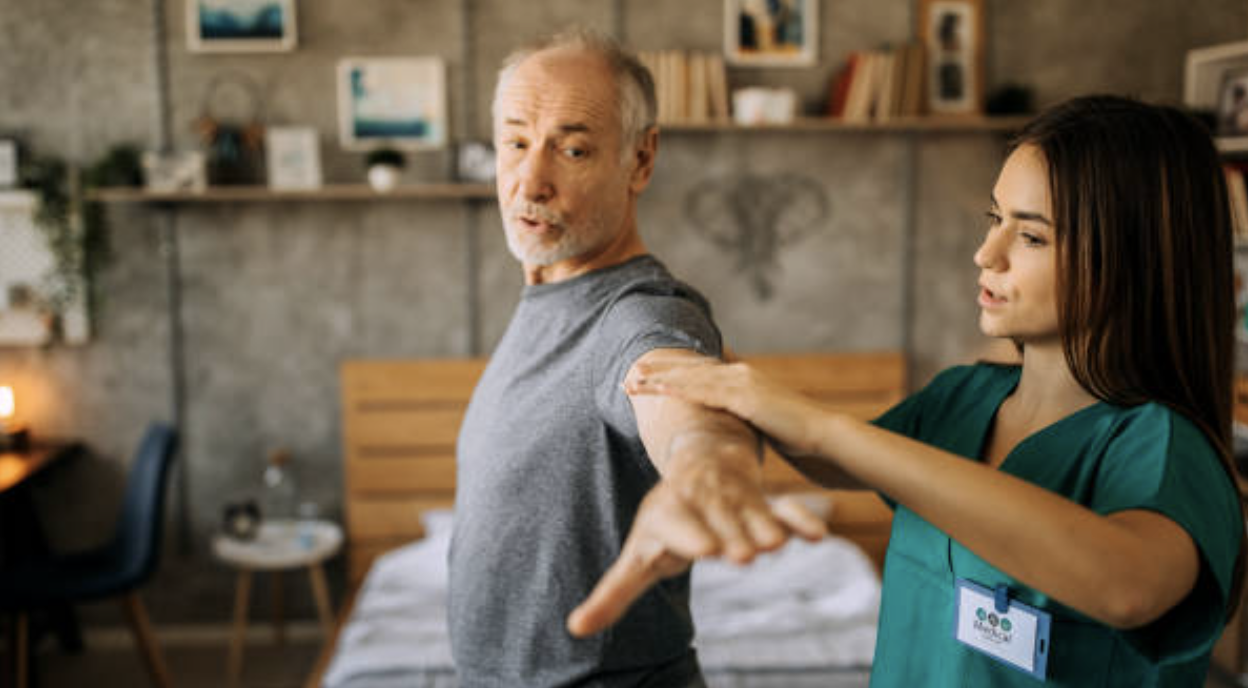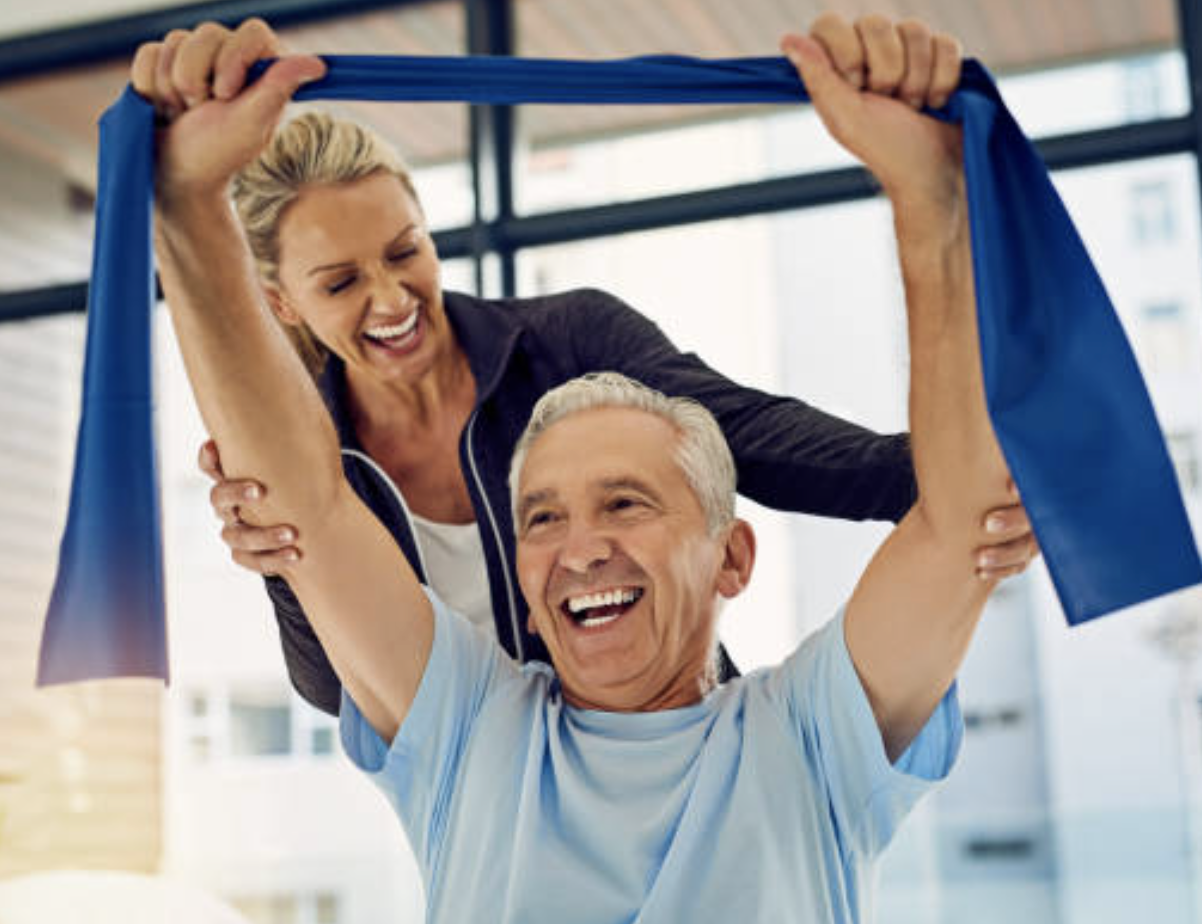Professional Treatment
Rehabilitation
in London
Expert rehabilitation specialists providing comprehensive programs
to
restore function, improve mobility, and enhance quality of life.
Qualified rehabilitation experts
Evening & weekend appointments
Hundreds of satisfied patients

Restore function, regain independence, and return to activities you love with our specialized rehabilitation programs
At Holistic Healthcare Clinics, our rehabilitation services are delivered by experienced, certified specialists who combine evidence-based approaches with personalized care. Whether you're recovering from surgery, injury, illness, or managing a chronic condition, our comprehensive approach ensures you receive the perfect rehabilitation program for your specific needs.
Our London clinic offers a range of rehabilitation services including orthopedic rehabilitation, neurological rehabilitation, sports rehabilitation, and post-surgical rehabilitation, all designed to address your unique condition and help you achieve optimal recovery and function.
Choose the perfect rehabilitation program for your specific needs
Our orthopedic rehabilitation focuses on restoring function and mobility after injuries, surgeries, or conditions affecting bones, joints, muscles, and connective tissues. Particularly effective for:
Programs typically run 6-12 weeks, with a thorough evaluation before creating a personalized treatment plan tailored to your specific recovery needs and goals.
Neurological rehabilitation involves specialized approaches for conditions affecting the nervous system. Our programs focus on improving motor function, coordination, and independence. This specialized approach is especially beneficial for:
Our specialists use advanced neurological rehabilitation techniques to help patients recover lost functions, develop compensatory strategies, and improve overall quality of life.
Post-surgical rehabilitation focuses on optimizing recovery after any surgical procedure, minimizing complications and helping you regain function as quickly and safely as possible. This specialized program is particularly effective for:
Treatment programs are carefully staged to follow surgical protocols, respecting healing timelines while progressively advancing function, strength, and mobility to optimize your recovery.
Sports rehabilitation combines advanced rehabilitation techniques with specialized knowledge of sports biomechanics to help athletes and active individuals recover from injuries and return to their sport or activity. Ideal for:
Our sports rehabilitation specialists understand the unique demands of different sports and activities, providing targeted programs that address specific movement patterns and performance requirements.
Not sure which rehabilitation program is right for you? Contact us for a free consultation or call 0207 526 4925
Our experienced specialists are skilled in addressing a wide range of conditions requiring rehabilitation
Rehabilitation is essential following surgery, helping to optimize healing, minimize complications, and restore function. Our comprehensive programs address pain management, mobility, strength, and functional activities to ensure successful recovery.
Our specialized neurological rehabilitation addresses stroke, traumatic brain injury, spinal cord injury, multiple sclerosis, and other neurological disorders, focusing on motor control, balance, coordination, and daily function.
Our comprehensive sports rehabilitation programs address acute injuries, overuse conditions, and post-surgical recovery for athletes, with a focus on safe return to sport and performance optimization.
Our rehabilitation programs address fractures, joint replacements, ligament injuries, and other orthopedic conditions through progressive exercise, functional training, and pain management strategies.
Our multidisciplinary approach to chronic pain rehabilitation combines movement therapy, pain neuroscience education, graded activity exposure, and self-management strategies to improve function and quality of life.
Our specialized programs address balance impairments, fall risk, and mobility limitations in older adults and those with neurological or vestibular conditions, enhancing safety and preserving independence.
Comprehensive, goal-oriented care focused on your individual needs

Our rehabilitation process begins with a thorough evaluation of your condition, functional limitations, medical history, and personal goals. This detailed assessment allows us to identify key impairments and establish a baseline for measuring progress throughout your rehabilitation journey.
We develop individualized rehabilitation plans with clear, measurable goals that are meaningful to you. Whether your aim is to return to work, sports, or simply improve daily activities, our programs are designed to help you achieve specific functional outcomes.
Rehabilitation is a journey of gradual progression. Our specialists carefully structure your program to safely advance through stages of recovery, challenging you appropriately while respecting tissue healing timeframes and preventing setbacks.
We coordinate with your entire healthcare team, including physicians, surgeons, physiotherapists, osteopaths, and other specialists when beneficial, creating integrated treatment plans that provide comprehensive care for optimal recovery.
Beyond guided rehabilitation sessions, we emphasize education about your condition, home exercise programs, and strategies to maintain progress and prevent recurrence. This empowers you to take an active role in your recovery and long-term health.
Specialized techniques tailored to your specific condition and recovery goals
Customized exercise programs designed to improve strength, flexibility, endurance, and motor control. These exercises are progressively advanced to restore function and prepare you for return to daily activities or sports.
Task-specific training that simulates real-life activities required for work, sports, or daily living. This approach bridges the gap between basic exercises and successful return to meaningful activities.
Hands-on techniques to improve tissue mobility, reduce pain, and enhance movement quality. These approaches include joint mobilization, soft tissue techniques, and neuromuscular facilitation to optimize recovery.
Therapeutic modalities such as electrical stimulation, ultrasound, and laser therapy to manage pain, reduce inflammation, and promote tissue healing when appropriate as adjuncts to active rehabilitation approaches.
Specialized exercises to improve balance, body awareness, and coordination. These techniques are essential for fall prevention, neurological rehabilitation, and return to dynamic activities.
Techniques to improve movement efficiency, motor control, and muscle recruitment patterns. This approach is crucial for retraining proper movement after injury or neurological conditions.
Graduated aerobic exercise programs to improve endurance, cardiovascular health, and overall fitness. These programs are tailored to your current capacity and gradually progressed to meet your activity demands.
Exercise and rehabilitation in a pool environment where buoyancy reduces weight-bearing stress. Particularly beneficial for those with pain, weight-bearing restrictions, or difficulty with land-based exercise.
Integration of rehabilitation technology including biofeedback, virtual reality, and specialized equipment to enhance recovery outcomes, particularly for complex neurological and orthopedic conditions.
All rehabilitation programs are delivered by qualified, experienced specialists in a safe, supportive environment using evidence-based approaches.
Book Your Rehabilitation AssessmentHow rehabilitation can improve your health and wellbeing through personalized programs and evidence-based techniques
Comprehensive rehabilitation programs address the root causes of pain by improving movement patterns, building strength in supporting muscles, and teaching self-management strategies.
Targeted rehabilitation techniques help rebuild functional abilities affected by injury, surgery, or illness, allowing you to return to daily activities and the things you enjoy.
Progressive exercise programs enhance muscular strength, cardiovascular fitness, and overall stamina, promoting better energy levels and resilience for daily demands.
Rehabilitation focuses on restoring optimal movement patterns and flexibility, helping you move more efficiently with less pain and greater range of motion in daily activities.
Rehabilitation addresses biomechanical imbalances and movement deficiencies, reducing the risk of future injuries and creating more resilient movement patterns for long-term health.
Comprehensive rehabilitation empowers you with the skills, strength, and strategies needed to maximize your independence and confidence in daily activities and personal care.
Read about the experiences of those we've helped
"After my knee replacement surgery, I was worried about getting back to my normal activities. The orthopedic rehabilitation program at Holistic Healthcare Clinics was comprehensive and personalized. Their step-by-step approach helped me regain strength and confidence I hadn't thought possible."
"The neurological rehabilitation I received following my stroke was life-changing. When I started, I could barely move my left arm. The specialists designed a program that gradually rebuilt my strength and coordination. Their expertise and encouragement made all the difference in my recovery."
"As a professional athlete with a serious ACL tear, I thought my career might be over. The sports rehabilitation team developed a comprehensive recovery plan that addressed every aspect of my injury. Their expertise in sport-specific rehabilitation has me performing even better than before my injury."
Answers to common questions about rehabilitation programs
A comprehensive rehabilitation program typically involves:
Sessions typically last 45-60 minutes, with frequency and program duration tailored to your specific condition and progress.
The duration of rehabilitation varies significantly based on several factors:
As a general guideline:
After your initial assessment, your rehabilitation specialist will provide a projected timeline with key milestones. This timeline will be regularly reviewed and adjusted based on your progress and response to treatment.
Rehabilitation should be challenging but not excessively painful. At Holistic Healthcare Clinics, our specialists carefully balance progress with comfort to ensure effective recovery.
Common sensations you may experience during rehabilitation include:
Your rehabilitation specialist will teach you to distinguish between productive discomfort (which indicates progress) and counterproductive pain (which may signal potential harm). We use a pain monitoring scale to ensure exercises remain in the appropriate range.
Our approach is collaborative—we encourage you to communicate openly about your comfort level, allowing us to adjust your program appropriately while still making progress toward your rehabilitation goals.
Rehabilitation works through several key principles and mechanisms:
Through these mechanisms, rehabilitation doesn't just treat symptoms—it addresses underlying causes of dysfunction, rebuilds capacity, and restores physical abilities. The process is active and requires your participation, making you a partner in your recovery rather than a passive recipient of treatment.
Before starting rehabilitation:
During your rehabilitation program:
Between sessions:
Remember that rehabilitation is a partnership between you and your healthcare team. Your active participation and consistent effort are essential components of a successful outcome.
Have other questions about rehabilitation? Contact our team for personalized answers or book a consultation.
Book an appointment today and take the first step towards restored function and independence.